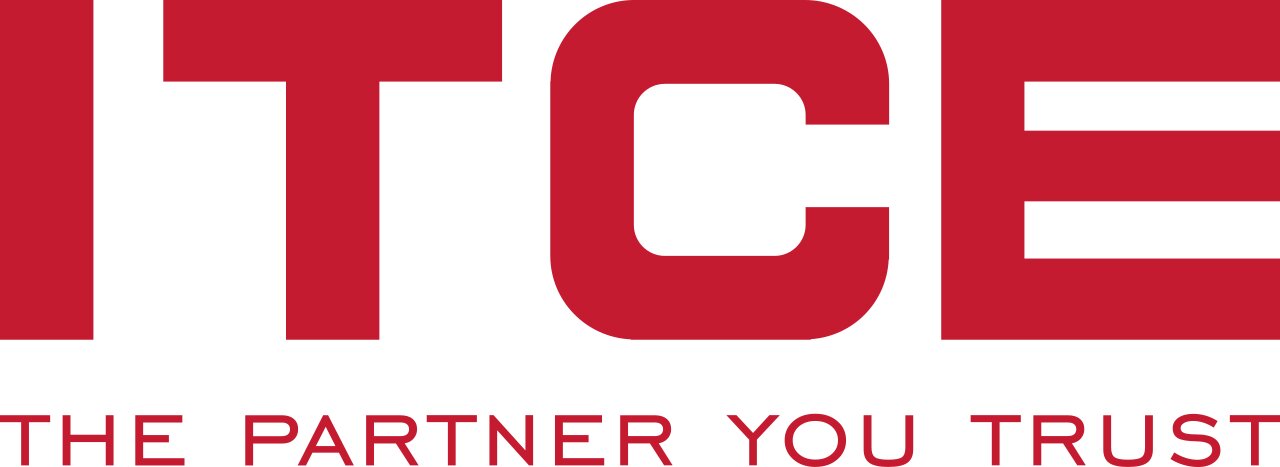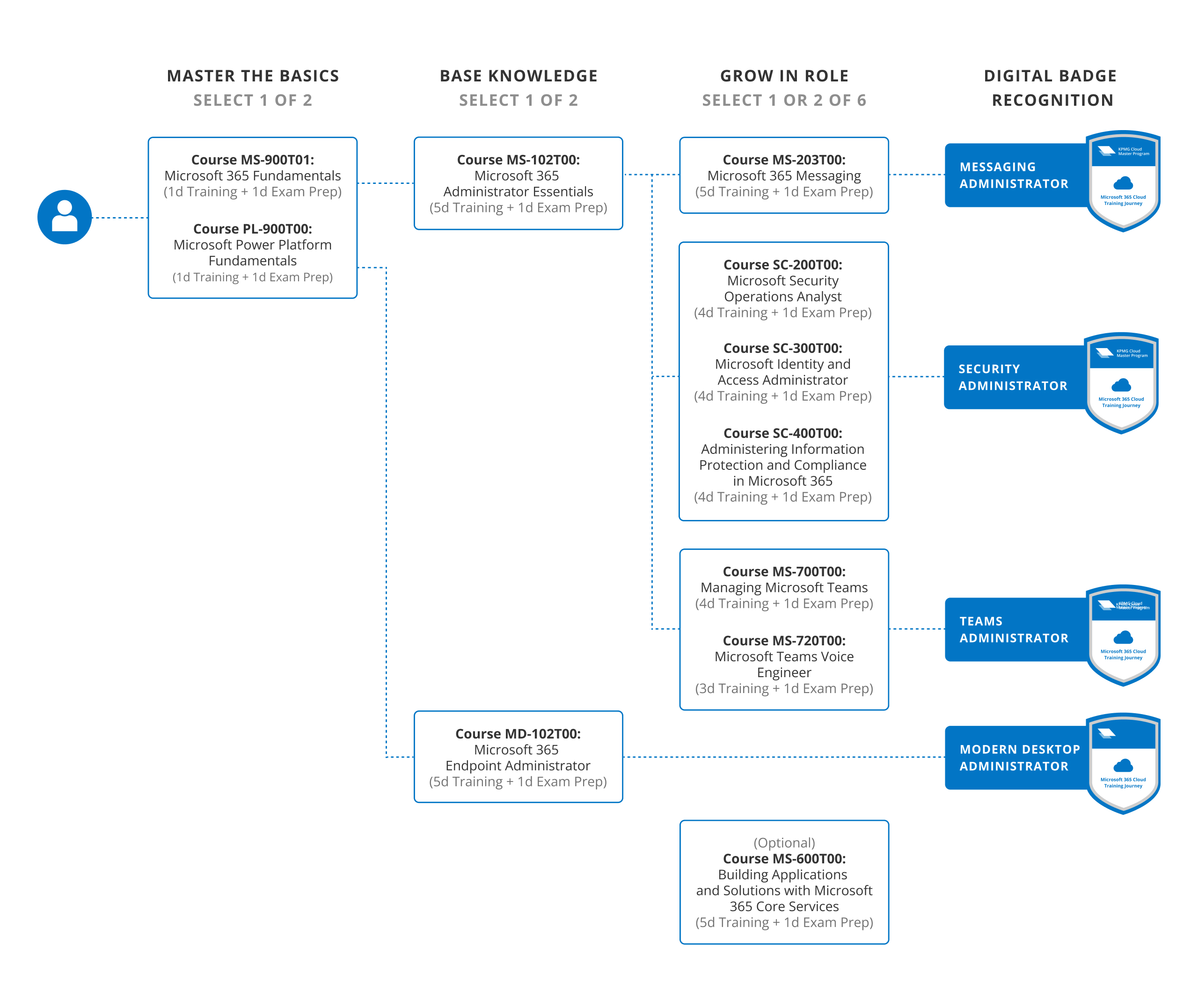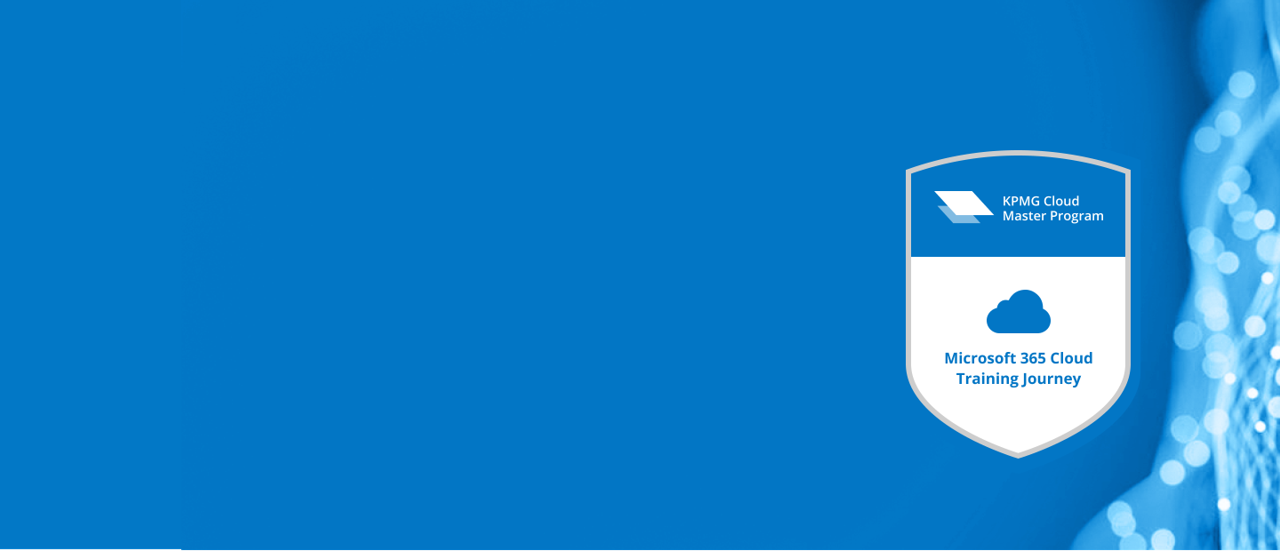In cooperation with


Excel at the role of Microsoft 365 Engineer/Consultant by completing a sequence of training courses focused on Microsoft 365 services including identity & services, mobility & security, managing MS Teams, messaging and security administration. In parallel, you are recommended to attend the short modules on Agile & Consulting Core Competencies to help you master essential consulting skills.
Who is this suitable for?
If your responsibilities include evaluating, planning, migrating, deploying, and managing Microsoft 365 services —this is the training journey for you.
Microsoft 365 Cloud Training Journey

Program contents
MS-900T01 Microsoft 365 Fundamentals (1 day)
Find full course outline
here.
This course introduces Microsoft 365, an integrated cloud
platform that delivers industry-leading productivity apps
along with intelligent cloud services, and world-class
security. You’ll learn foundational knowledge on the
considerations and benefits of adopting cloud services and the
Software as a Service (SaaS) cloud model, with a specific
focus on Microsoft 365 cloud service offerings. You will begin
by learning about cloud fundamentals, including an overview of
cloud computing. You will be introduced to Microsoft 365 and
learn how Microsoft 365 solutions improve productivity,
facilitate collaboration, and optimize communications. The
course then analyzes how security, compliance, privacy, and
trust are handled in Microsoft 365, and it concludes with a
review of Microsoft 365 subscriptions, licenses, billing, and
support.
+ Exam Preparation and Q&A Session (1 day)
+ MS-900 Certification Exam
Delivery formats:
Online instructor-led
Self-paced
PL-900T00 Microsoft Power Platform Fundamentals (1 day)
Find full course outline
here.
The audience for this course is looking to familiarize
themselves with the fundamentals of security, compliance, and
identity (SCI) across cloud-based and related Microsoft
services. The content for this course aligns to the SC-900
exam objective domain. Candidates should be familiar with
Microsoft Azure and Microsoft 365 and understand how Microsoft
security, compliance, and identity solutions can span across
these solution areas to provide a holistic and end-to-end
solution.
+ Exam Preparation and Q&A Session (1 day)
+ PL-900 Certification Exam
Delivery formats:
Online instructor-led
Self-paced
MS-102T00: Microsoft 365 Administrator Essentials (5
days)
Find full course outline
here.
This course covers the following key elements of Microsoft 365
administration: Microsoft 365 tenant management, Microsoft 365
identity synchronization, and Microsoft 365 security and
compliance.
In Microsoft 365 tenant management, you learn how to configure
your Microsoft 365 tenant, including your organizational
profile, tenant subscription options, component services, user
accounts and licenses, security groups, and administrative
roles. You then transition to configuring Microsoft 365, with
a primary focus on configuring Office client connectivity.
Finally, you explore how to manage user-driven client
installations of Microsoft 365 Apps for enterprise
deployments.
The course then transitions to an in-depth examination of
Microsoft 365 identity synchronization, with a focus on Azure
Active Directory Connect and Connect Cloud Sync. You learn how
to plan for and implement each of these directory
synchronization options, how to manage synchronized
identities, and how to implement password management in
Microsoft 365 using multifactor authentication and
self-service password management.
In Microsoft 365 security management, you begin examining the
common types of threat vectors and data breaches facing
organizations today. You then learn how Microsoft 365’s
security solutions address each of these threats. You are
introduced to the Microsoft Secure Score, as well as to Azure
Active Directory Identity Protection. You then learn how to
manage the Microsoft 365 security services, including Exchange
Online Protection, Safe Attachments, and Safe Links. Finally,
you are introduced to the various reports that monitor an
organization’s security health. You then transition from
security services to threat intelligence; specifically, using
Microsoft 365 Defender, Microsoft Defender for Cloud Apps, and
Microsoft Defender for Endpoint.
Once you have this understanding of Microsoft 365’s security
suite, you then examine the key components of Microsoft 365
compliance management. This begins with an overview of all key
aspects of data governance, including data archiving and
retention, Microsoft Purview message encryption, and data loss
prevention (DLP). You then delve deeper into archiving and
retention, paying particular attention to Microsoft Purview
insider risk management, information barriers, and DLP
policies. You then examine how to implement these compliance
features by using data classification and sensitivity labels.
+ Exam Preparation and Q&A Session (1 day)
+ MS-102 Certification Exam
Delivery formats:
Online instructor-led
Self-paced
MD-102T00: Microsoft 365 Endpoint Administrator (5 days)
Find full course outline
here.
In this course, students will learn to plan and execute an
endpoint deployment strategy using contemporary deployment
techniques and implementing update strategies. The course
introduces essential elements of modern management,
co-management approaches, and Microsoft Intune integration. It
covers app deployment, management of browser-based
applications, and key security concepts such as
authentication, identities, access, and compliance policies.
Technologies like Azure Active Directory, Azure Information
Protection, and Microsoft Defender for Endpoint are explored
to protect devices and data.
+ Exam Preparation and Q&A Session (1 day)
+ MD-102 Certification Exam
Delivery formats:
Online instructor-led
Self-paced
MS-203T00 Microsoft 365 Messaging (5 days)
Find full course outline
here.
The Messaging Administrator plans, deploys, configures,
troubleshoots, and secures the messaging infrastructure in a
hybrid and cloud enterprise environment. Responsibilities
include managing recipients, mailboxes, transport, mail flow,
administrative roles, threat protection, compliance,
migrations, and client connectivity. To implement a secure
hybrid topology that meets the business needs of a modern
organization, the Messaging Administrator must collaborate
with other workload administrators and the Microsoft 365
enterprise administrator. The Messaging Administrator should
have a working knowledge of authentication types, licensing,
and integration with Microsoft 365 applications.
+ Exam Preparation and Q&A Session (1 day)
+ MS-203 Certification Exam
Delivery formats:
Online instructor-led
Self-paced
SC-200T00: Microsoft Security Operations Analyst (4 days)
Find full course outline
here.
Learn how to investigate, respond to, and hunt for threats
using Microsoft Sentinel, Microsoft Defender for Cloud, and
Microsoft 365 Defender. In this course you will learn how to
mitigate cyberthreats using these technologies. Specifically,
you will configure and use Microsoft Sentinel as well as
utilize Kusto Query Language (KQL) to perform detection,
analysis, and reporting. The course was designed for people
who work in a Security Operations job role and helps learners
prepare for the exam SC-200: Microsoft Security Operations
Analyst.
+ Exam Preparation and Q&A Session (1 day)
+ SC-200 Certification Exam
Delivery formats:
Online instructor-led
Self-paced
SC-300T00: Microsoft Identity and Access Administrator (4
days)
Find full course outline
here.
The Microsoft Identity and Access Administrator course
explores how to design, implement, and operate an
organization’s identity and access management systems by using
Azure AD. Learn to manage tasks such as providing secure
authentication and authorization access to enterprise
applications. You will also learn to provide seamless
experiences and self-service management capabilities for all
users. Finally, learn to create adaptive access and governance
of your identity and access management solutions ensuring you
can troubleshoot, monitor, and report on your environment. The
Identity and Access Administrator may be a single individual
or a member of a larger team. Learn how this role collaborates
with many other roles in the organization to drive strategic
identity projects. The end goal is to provide you knowledge to
modernize identity solutions, to implement hybrid identity
solutions, and to implement identity governance.
+ Exam Preparation and Q&A Session (1 day)
+ SC-300 Certification Exam
Delivery formats:
Online instructor-led
Self-paced
SC-400T00: Administering Information Protection and Compliance in Microsoft 365 (4
days)
Find full course outline
here.
Learn how to protect information in your Microsoft 365
deployment. This course focuses on data lifecycle management
and information protection and compliance within your
organization. The course covers implementation of data loss
prevention policies, sensitive information types, sensitivity
labels, data retention policies, Microsoft Purview Message
Encryption, audit, eDiscovery, and insider risk among other
related topics. The course helps learners prepare for the
Microsoft Information Protection Administrator exam (SC-400).
+ Exam Preparation and Q&A Session (1 day)
+ SC-400 Certification Exam
Delivery formats:
Online instructor-led
Self-paced
MS-700T00 Managing Microsoft Teams (4 days)
Find full course outline
here.
Students in this course are interested in Microsoft Teams or
in passing the Microsoft Teams Administrator Associate
certification exam. A Microsoft Teams administrator plans,
deploys, configures, and manages Microsoft Teams to focus on
efficient and effective collaboration and communication in a
Microsoft 365 environment. A Microsoft Teams administrator
must be able to plan, deploy, and manage teams, chat, apps,
channels, meetings, audio/video conferencing, live events,
calling, and Teams certified devices. A Microsoft Teams
administrator has experience integrating Microsoft Teams with
SharePoint, OneDrive, Exchange, Microsoft 365 Groups, and
other Microsoft, third-party, and custom apps. A Microsoft
Teams administrator understands and collaborates with other
workloads and roles, such as Network, Voice, Identity, Access,
Devices, Licensing, Security, Compliance, Information
management, and User Adoption.
+ Exam Preparation and Q&A Session (1 day)
+ MS-700 Certification Exam
Delivery formats:
Online instructor-led
Self-paced
MS-720T00 Microsoft Teams Voice Engineer (3 days)
Find full course outline
here.
The Microsoft Teams Voice Engineer plans, designs, configures,
maintains, and troubleshoots an integrated communications
solution at an organization. The Microsoft Teams Voice
Engineer must be able to translate business requirements into
technical architecture and designs for communication
solutions. The Microsoft Teams Voice Engineer is familiar with
telecommunication technologies and has experience in Microsoft
Teams, Microsoft 365, and PowerShell. They must be able to
deploy and configure Microsoft Teams Phone with PSTN
connectivity through Direct Routing, Operator Connect, and
Teams Calling Plans. The Microsoft Teams Voice Engineer
manages Teams-certified devices, audio/video conferencing, and
voice migration. The Microsoft Teams Voice Engineer
collaborates with telephony providers and third-party vendors
to enable advanced voice features in Microsoft Teams. The
Microsoft Teams Voice Engineer also works with administrators
for other workloads, including networking, identity,
licensing, security, and compliance. To earn the Microsoft
Teams Voice Engineer certification, candidates must pass Exam
MS-700: Managing Microsoft Teams in addition to the MS-720
exam.
+ Exam Preparation and Q&A Session (1 day)
+ MS-720 Certification Exam
Delivery formats:
Online instructor-led
Self-paced
(Optional) MS-600T00 Building Applications and Solutions
with Microsoft 365 Core Services (5 days)
Find full course outline
here.
The Building applications and solutions with Microsoft 365
core services course is designed for persons who are aspiring
to the Microsoft Teams Application Developer role. In this
course, students will learn how to build collaboration
solutions leveraging 4 central elements of the Microsoft 365
platform: implementing Microsoft identity, working with
Microsoft Graph, extending and customizing Microsoft 365 with
SharePoint Framework, and building applications for Microsoft
Teams. In Implement Microsoft identity, students will learn to
implement Microsoft identity including registering an
application, implementing authentication, configuring
permissions to consume an API, and creating a service to
access Microsoft Graph. In Work with Microsoft Graph, students
will learn how to access user data, explore query parameters,
manage a group lifecycle, access files, and optimize network
traffic using Microsoft Graph. In Extend and customize
Microsoft 365 with SharePoint Framework, students will learn
about SharePoint Framework web parts, extensions, and how to
package and deploy a SPFx solution. In Build apps for
Microsoft Teams, students will look at the components of a
Teams App, work with webhooks, tabs, conversational bots, and
other Microsoft Teams app capabilities. They will also learn
to deploy Microsoft Teams apps.
+ Exam Preparation and Q&A Session (1 day)
+ MS-600 Certification Exam
Delivery formats:
Online instructor-led
Self-paced
Throughout the program, we will be organising a series of internal events (such as project case studies and guest speaker slots) to support internal knowledge-sharing and encourage the conversation on how KPMG professionals are translating industry best practices in successful customer consulting projects.
After completing the sequence of Microsoft technology courses,
you will be granted a digital certification badge and a
training program completion certificate to serve as proof of
the focused time and effort you have invested in your
professional Cloud Consulting development.
Successfully obtaining the corresponding Microsoft
Certifications through certification exams is expected to be
an individual responsibility of the participants. This is an
important component of the program as professional
certification help you stand out and be recognised for your
expertise.
Our Trainers
Program Details
At the registration point you can choose from a drop-down menu between calendar dates for training with a trainer or a self-paced learning for some or all of the courses.

